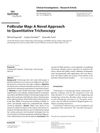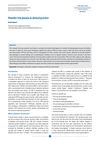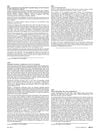 7 citations,
June 2019 in “Cureus”
7 citations,
June 2019 in “Cureus” Fractional lasers and microneedling, combined with topical agents, could potentially treat Alopecia Areata effectively, but more research is needed due to limited data.
 7 citations,
February 2018 in “InTech eBooks”
7 citations,
February 2018 in “InTech eBooks” Biomaterials combined with stem cells show promise for improving tissue repair and medical treatments.
 7 citations,
April 2017 in “Health Economics, Policy and Law”
7 citations,
April 2017 in “Health Economics, Policy and Law” The document suggests reevaluating the patent system to ensure public benefits from pharmaceutical privileges and to encourage more significant innovations.
 7 citations,
June 2015 in “The American Journal of the Medical Sciences”
7 citations,
June 2015 in “The American Journal of the Medical Sciences” Finasteride helps reduce blood vessel growth in diabetic rat kidneys.
 7 citations,
April 2012 in “Clinical investigation”
7 citations,
April 2012 in “Clinical investigation” Transdermal testosterone can improve sexual desire in postmenopausal women but lacks long-term safety data and is not FDA-approved for this use.
 6 citations,
December 2020 in “Dermatological reviews”
6 citations,
December 2020 in “Dermatological reviews” COVID-19 may worsen with androgens; anti-androgen drugs could help.
 6 citations,
August 2014 in “Toxicologic pathology”
6 citations,
August 2014 in “Toxicologic pathology” Blocking DGAT1 reduces oil gland size in mice and dogs, but only mice experience hair loss.
 5 citations,
May 2020 in “Clinical and Experimental Dermatology”
5 citations,
May 2020 in “Clinical and Experimental Dermatology” Clascoterone may be a promising treatment for hair loss.
 5 citations,
August 2019 in “iScience”
5 citations,
August 2019 in “iScience” Deleting the Trf1 protein in mice is safe and may help prevent cancer without major side effects.
 5 citations,
April 2019 in “Plastic and reconstructive surgery. Global open”
5 citations,
April 2019 in “Plastic and reconstructive surgery. Global open” Fractional lasers could help hair regrowth in androgenic alopecia, but more research is needed to confirm their effectiveness and safety.
4 citations,
June 2023 in “Frontiers in immunology” JAK inhibitors help hair regrowth in alopecia areata but have a high risk of side effects.
 4 citations,
September 2020 in “BioMed Research International”
4 citations,
September 2020 in “BioMed Research International” Timosaponin BII, a plant extract, was found to promote hair growth in mice, similarly to minoxidil.
 4 citations,
January 2019 in “Skin appendage disorders”
4 citations,
January 2019 in “Skin appendage disorders” The new Follicular Map method could help assess hair treatment effectiveness but has some limitations.
 4 citations,
August 2001 in “Epilepsia”
4 citations,
August 2001 in “Epilepsia” Treating epilepsy is complex, requiring careful drug choice and patient adherence to manage seizures and side effects.
 3 citations,
August 2023 in “Drug safety”
3 citations,
August 2023 in “Drug safety” Proactive monitoring and management are essential to maximize the benefits of Trastuzumab Deruxtecan while minimizing serious side effects.
 3 citations,
August 2021 in “Uro”
3 citations,
August 2021 in “Uro” Saw palmetto may improve urinary symptoms with fewer sexual side effects compared to some medications.
 3 citations,
March 2020 in “International Journal of Dermatology”
3 citations,
March 2020 in “International Journal of Dermatology” Tildrakizumab showed limited effectiveness in treating chronic alopecia areata in a small group of patients.
 3 citations,
January 2016 in “South African family practice”
3 citations,
January 2016 in “South African family practice” Platelet-rich plasma is considered safe but needs more research to prove its effectiveness in medical treatments.
 3 citations,
April 2011 in “Expert Review of Dermatology”
3 citations,
April 2011 in “Expert Review of Dermatology” Mesotherapy lacks strong evidence for effectiveness and safety, and its ingredients are not FDA-approved for subcutaneous use.
 2 citations,
April 2017 in “Actas Dermo-Sifiliográficas”
2 citations,
April 2017 in “Actas Dermo-Sifiliográficas” Best treatment for Frontal Fibrosing Alopecia is 5-alpha-reductase inhibitors and intralesional corticosteroids.
 2 citations,
April 2016 in “Medical Hypotheses”
2 citations,
April 2016 in “Medical Hypotheses” Antioxidants might help prevent pressure ulcers, but more research is needed to find effective ones.
 1 citations,
January 2024 in “Theranostics”
1 citations,
January 2024 in “Theranostics” Exosomes show promise for future tissue regeneration.
 1 citations,
August 2023 in “International journal of pharmacy & integrated health sciences”
1 citations,
August 2023 in “International journal of pharmacy & integrated health sciences” Cosmeceuticals are popular for their skin health benefits and anti-aging effects.
 1 citations,
July 2021 in “Curēus”
1 citations,
July 2021 in “Curēus” A child had a rare case of scarring hair loss with skin disease, which is hard to treat and stressful.
 1 citations,
April 2018 in “Journal of Investigative Dermatology”
1 citations,
April 2018 in “Journal of Investigative Dermatology” Tofacitinib helped most patients with alopecia areata regrow hair and changes in immune cells were linked to the treatment's effectiveness.
 1 citations,
January 2017 in “Expert opinion on orphan drugs”
1 citations,
January 2017 in “Expert opinion on orphan drugs” Adalimumab is the most effective treatment for severe hidradenitis suppurativa, but more research is needed to improve treatment options.
 1 citations,
May 2015 in “Journal of The American Academy of Dermatology”
1 citations,
May 2015 in “Journal of The American Academy of Dermatology” Oral clindamycin and rifampicin are the most effective treatments for Folliculitis decalvans.
 1 citations,
June 2001 in “Annals of Internal Medicine”
1 citations,
June 2001 in “Annals of Internal Medicine” The document concludes that there is no credible evidence that distant healing works, and it should not be further studied in medical literature.
 1 citations,
July 1997 in “Inpharma Weekly”
1 citations,
July 1997 in “Inpharma Weekly” Finasteride improves hair growth and satisfaction in men with male pattern baldness but may cause sexual side effects.

Stem cell therapy shows promise for treating hair loss in androgenetic alopecia.




























